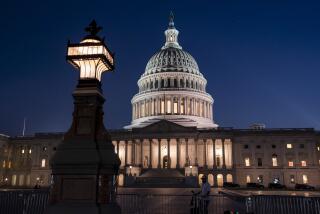Senate Resolution Urges ‘Free Elections’ in S. Korea
- Share via
WASHINGTON — The Senate, in the wake of violent anti-government protests in South Korea last week, voted unanimously Saturday to call for “meaningful and free elections” and the establishment of a “genuine democracy” in the strife-torn nation.
The resolution, passed by senators during a break in the marathon debate on the omnibus trade bill, was intended to increase U.S. pressure on South Korean President Chun Doo Hwan to reach an agreement with opposition leaders on constitutional reforms of the nation’s presidential selection system.
With the Administration concerned about pushing Chun too hard, however, the measure was also designed to blunt a tougher amendment being drafted that would strip South Korea of special trading privileges that it enjoys.
Buying Time
“We may have bought some time for the Chun regime to move towards an accommodation,” said Sen. Dennis DeConcini (D-Ariz.), author of the bipartisan resolution, which was supported by the Administration.
He added that while he opposes sanctions against South Korea at the present time, he and other senators might change their minds “if there was a brutal response by the military forces toward the people there” or if the Chun government began making arrests without bail during continued street protests.
“The United States supports the efforts of Koreans to establish fair and free elections and peacefully evolve to a full democratic government,” the resolution said. It warned the Chun government that a “peaceful transfer of power is endangered by inability to agree on timely democratic reforms essential for free and fair national elections.”
An amendment to the trade bill that would remove South Korea’s trade preferences and make it subject to standard tariffs is expected to be introduced by Sens. Edward M. Kennedy (D-Mass.) and Barbara Mikulski (D-Md.).
The Administration believes that South Korea, along with other prosperous East Asian nations, should soon be weaned from the “General System of Preferences” designed to help Third World nations develop their economies. However, it opposes singling out South Korea now while the Chun government is facing a domestic crisis.
Byrd Calls Rare Session
The rare Saturday session of the Senate was called by Majority Leader Robert C. Byrd (D-W.Va.) to hurry the chamber along in legislating the 1,000-page trade package before it. But many senators had not completed work on amendments addressing the substance of the bill, which may take weeks to process, and no action on key measures was taken.
Senate Finance Committee Chairman Lloyd Bentsen (D-Tex.), the prime manager of the trade package, told reporters that he and other key players in the legislation used the session to hold behind-the-scenes meetings to work out possible compromises on controversial proposals to speed up action next week.
These measures, most of which are opposed by the Administration, include mandatory trade protection for industries hurt by competition, restrictions on companies’ ability to close money-losing plants and mandatory retaliation against countries that have large trade surpluses with the United States.
Toshiba May Be Targeted
Bentsen said the Senate is likely to approve a ban on imports of Toshiba products to punish the Japanese company for selling submarine technology to the Soviets. He said he has not decided whether to support such a measure, but added, “I’d guess it’ll carry.” As a result of the sale of special milling equipment, the Administration has said, the Soviets are building submarines with quieter propellers that make them harder to detect.
Much of Saturday’s debate concerned an issue peripheral to the trade package--a mandatory balanced budget measure sought by Sen. Phil Gramm (R-Tex.)
Gramm, through parliamentary wrangling, managed to force a roll call vote on the proposal, which would require Congress to vote by Oct. 1 on a constitutional amendment to balance the federal budget. It passed on a 59-11 vote.
However, Byrd, protesting that there would be no way to enforce the deadline, scheduled a vote soon on an amendment that would effectively disable the Gramm measure, and Senate leaders said there are ample votes to pass it. Byrd’s proposal would bar any Senate action on a balanced budget amendment until President Reagan first submits a balanced budget plan--and until Senate Republicans accept a campaign financing bill they have successfully filibustered to a stalemate for several weeks.
Release of Prisoners Urged
The final version of DeConcini’s resolution on Korea was a diluted version of one drafted earlier. It removed language saying, “Torture has no place in a democratic society,” but urged the release “of all political prisoners.”
“This amendment stresses the geostrategic military importance and longstanding friendship with Korea,” DeConcini said in a statement before the vote. “It supports the principle that political rights accompany economic success. And it supports the basic right that all societies deserve--the freedom of choice.”
The resolution specified that “the necessary conditions for meaningful and free elections include such internationally recognized standards as freedom of expression, freedom of the press, respect for due process of law, an independent judiciary, the restoration of full political and civil rights and legal guarantees for the proper and humane treatment of all detainees.”
More to Read
Sign up for Essential California
The most important California stories and recommendations in your inbox every morning.
You may occasionally receive promotional content from the Los Angeles Times.













